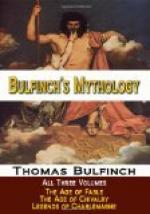Ogier returned covered with glory to the court of Charlemagne, and the Emperor, touched with this proof of his attachment, loaded him with caresses, and treated him almost as an equal.
We pass in silence the adventures of Ogier for several ensuing years, in which the fairy-gifts of his infancy showed their force in making him successful in all enterprises, both of love and war. He married the charming Belicene, and became the father of young Baldwin, a youth who seemed to inherit in full measure the strength and courage of his father and the beauty of his mother. When the lad was old enough to be separated from his mother, Ogier took him to court and presented him to Charlemagne, who embraced him and took him into his service. It seemed to Duke Namo, and all the elder knights, as if they saw in him Ogier himself, as he was when a youth; and this resemblance won for the lad their kind regards. Even Charlot at first seemed to be fond of him, though after a while the resemblance to Ogier which he noticed had the effect to excite his hatred.
Baldwin was attentive to Charlot, and lost no occasion to be serviceable. The Prince loved to play chess, and Baldwin, who played well, often made a party with him.
One day Charlot was nettled at losing two pieces in succession; he thought he could, by taking a piece from Baldwin, get some amends for his loss; but Baldwin, seeing him fall into a trap which he had set for him, could not help a slight laugh, as he said, “Check-mate.” Chariot rose in a fury, seized the rich and heavy chess-board, and dashed it with all his strength on the head of Baldwin, who fell, and died where he fell.
Frightened at his own crime, and fearing the vengeance of the terrible Ogier, Charlot concealed himself in the interior of the palace. A young companion of Baldwin hastened and informed Ogier of the event. He ran to the chamber, and beheld the body of his child bathed in blood, and it could not be concealed from him that Charlot gave the blow. Transported with rage, Ogier sought Charlot through the palace, and Charlot, feeling safe nowhere else, took refuge in the hall of Charlemagne, where he seated himself at table with Duke Namo and Salomon, Duke of Brittany. Ogier, with sword drawn, followed him to the very table of the Emperor. When a cupbearer attempted to bar his way he struck the cup from his hand and dashed the contents in the Emperor’s face. Charles rose in a passion, seized a knife, and would have plunged it into his breast, had not Salomon and another baron thrown themselves between, while Namo, who had retained his ancient influence over Ogier, drew him out of the room. Foreseeing the consequence of this violence, pitying Ogier, and in his heart excusing him, Namo hurried him away before the guards of the palace could arrest him, made him mount his horse, and leave Paris.




